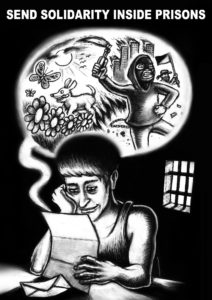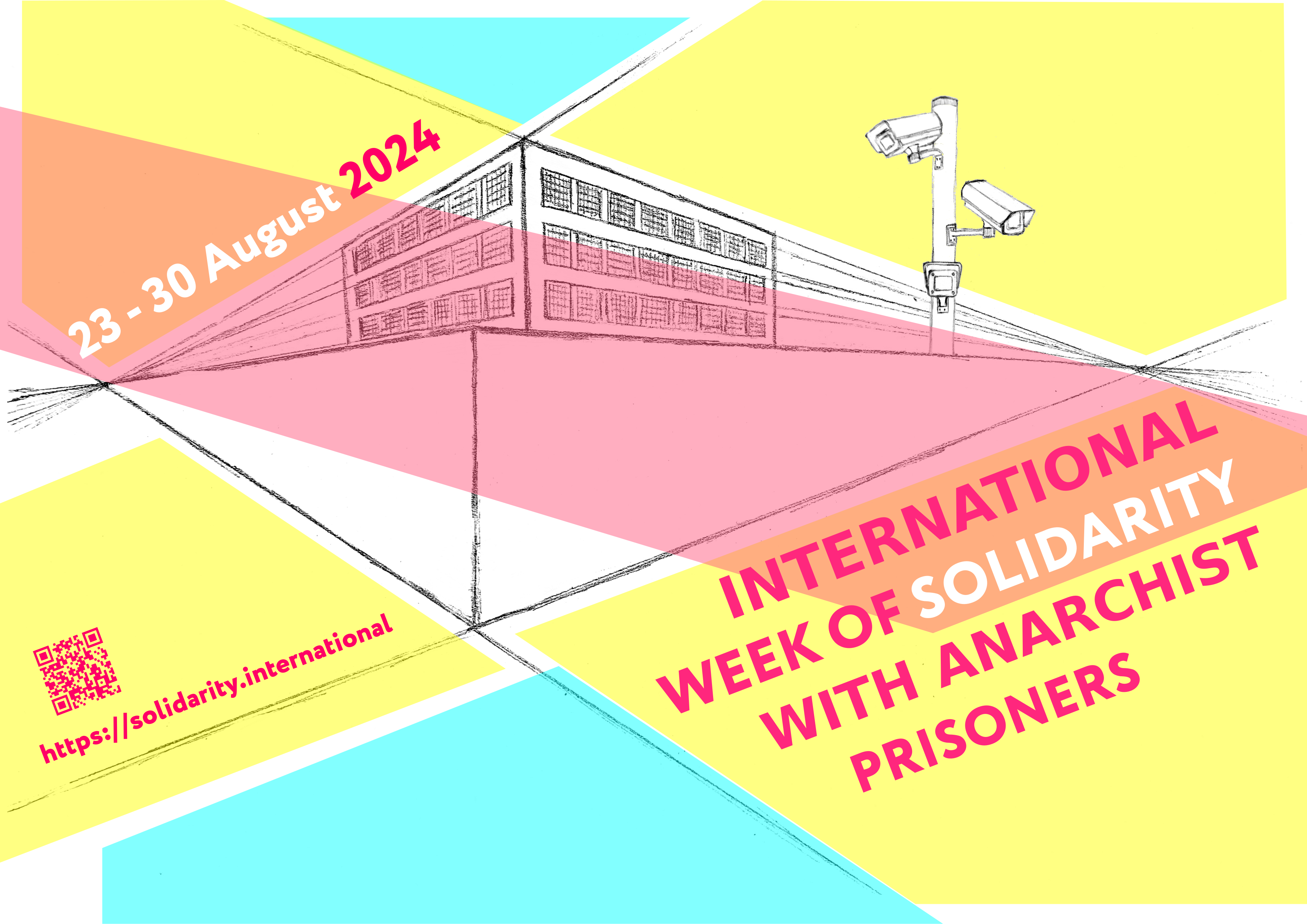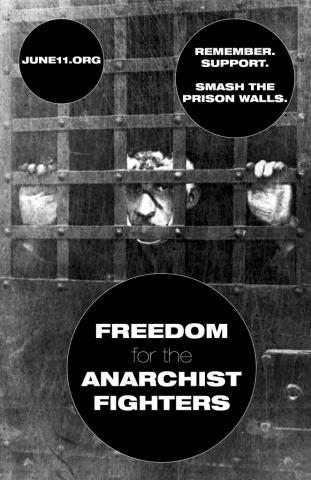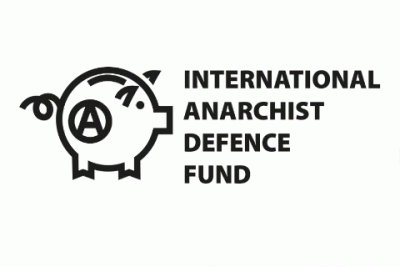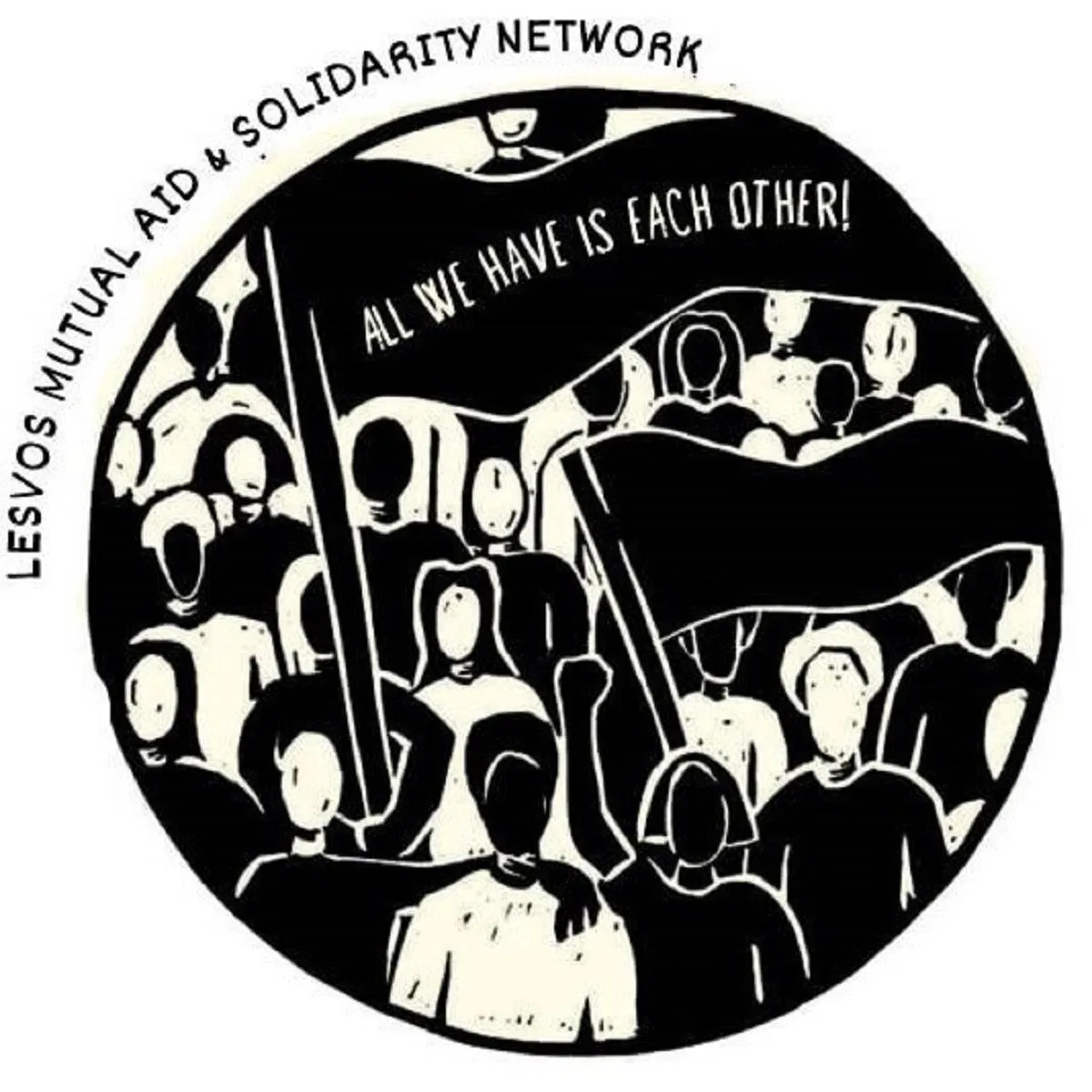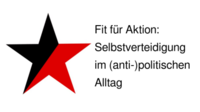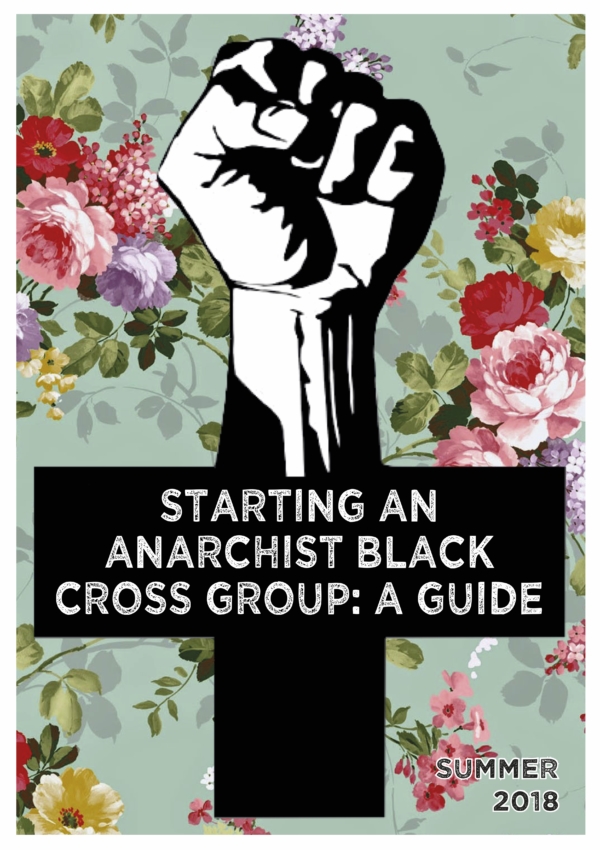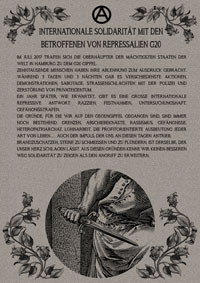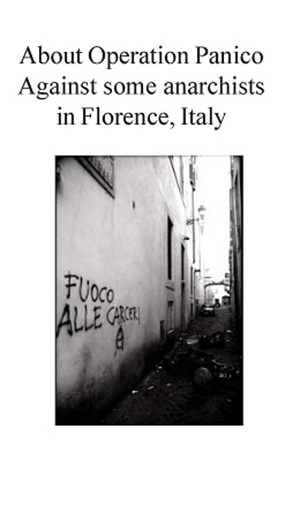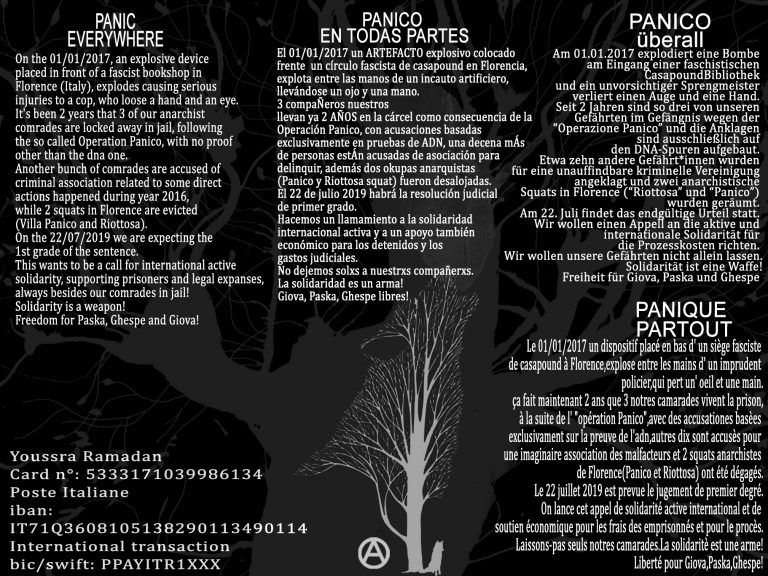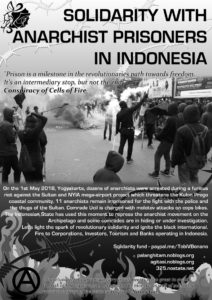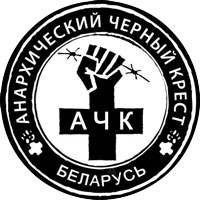 Das Anarchistische Radio Berlin führte ein Interview mit den Genoss_innen von ABC Belarus zur aktuellen Freilassung von Anarchist_Innen und den bevorstehenden Wahlen.
Das Anarchistische Radio Berlin führte ein Interview mit den Genoss_innen von ABC Belarus zur aktuellen Freilassung von Anarchist_Innen und den bevorstehenden Wahlen.
Das Interview gibt es in 3 Sprachen zum nachhören:
* Englisch
* Deutsch
* Spanisch
und hier noch die Interviews in schriftlicher Form:
Interview ABC Belarus_August 2015
On August 22, the Belarusian president Lukashenko signed papers to release all official political prisoners in the country. This includes the three anarchists that were still imprisoned. We talked with Anarchist Black Cross Belarus about their release and the upcoming elections among other things. You can find more information also in English on the website of ABC Belarus: abc-belarus.org
A-Radio Berlin:
Hi there, on August 22 you broke the news that „Europe’s last dictator“ finally released the remaining anarchist prisoners Ihar Alinevich, Mikalai Dziadok and Artsiom Prakapenko. What’s the background of this decision?
ABC Belarus:
Some of you may know that Belarus is sometimes called the last dictatorship in Europe. The country is under constant economic and political sanctions for violating human and political rights of the people as well as repressions. European Union and the USA have been demanding the release of all political prisoners since 2010. Since then a lot of people were pardoned by the president and released. By August 2015 there were six political prisoners left in jail including our comrades and an ex-candidate for the presidency. At the same time Lukashenko is getting ready for the new election planned for October 11, 2015. This gesture was for sure an attempt to gain some credibility in European ranks and introduce another ‚political thaw‘. Lukashenko has been using the same scheme every time he needs something from Europe. In this case he hopes for recognition of the election as transparent and democratic.
Did they need to sign anything? How long were their remaining sentences?
Artsiom Prakapenka applied for pardon in February 2015, but his appeal was rejected in April this year. The rest of the prisoners never signed anything like this and were pardoned on the initiative of the president himself. Mikalai was to be released in March 2016, Ihar – in November 2018, Artsiom – in January 2018.
Were all political prisoners released? If not, who is still in prison?
Yes, all those internationally recognized as political prisoners have been released. At the same time three more people were arrested at the beginning of August for political graffitis. They come from the so called ethnic-anarchist scene. We also support four antifascists who are not recognised political prisoners by the international organisations and an anarchist who prefers his case not to be public.
And, just out of curiosity, what might ethnic anarchists be?
These are people who come from antifascist football hooligans background which lately have been influenced a lot by patriotism and nationalist aesthetics. They propagate antifascism and antiauthoritarian ideas, but at the same time stand against the Russian cultural oppression and promote the revival of Belarusian culture and language. This mix ends up in slogans „Belarus must be Belarusian“, „Revolution of consciousness. It’s coming…“ „Peace to huts, war to palaces“.
How will the focus of your work shift now, if at all?
Actually, we were giving a lot of attention to the released comrades in 2010-2011, when support was most needed. Over time our support became equally distributed among the rest of our prisoners. That’s why we can’t say that we have lost a huge chunk of work with their release. At the moment we are preparing for the new electoral campaign which usually ends in new arrests and sentences. We also try to do more preventive work, educating activists about strategies to avoid repression and make the work of the police as difficult as possible.
What do you expect politically and repression-wise for the upcoming elections, due probably in Autumn 2015?
For now it looks extremely suspicious that the repression hasn’t started yet. Maybe the cops decided to first deal with the ‚ethnic anarchists‘ and football hooligans (in summer there were a few arrests). At the same time, we consider this inaction rather tactical. The cops don’t forget about anarchists and their closest circles which is proved by a recent raid on an open-air punk concert and a few criminal cases that were started after the solidarity campaign in January-February 2015. We feel that the cops are just waiting for the right time to use their ‚black lists‘ and start arresting people on suspicion of participation in the soli actions. What concerns the elections, it is still unclear if there is any protest at all, because the opposition is split and it is dangerous to call to the streets looking back at 2010 when every candidate for presidency was arrested. Anarchists themselves are far from having a vast social base that can join our call to protest. Many thanks!
Interview ABC Belarus_August 2015
Am 22. August unterschrieb der belorussische Präsident Lukashenko die Freilassungspapiere für alle offiziellen politischen Gefangenen im Land. Dazu gehörten auch die drei Anarchist*innen, die noch hinter Gittern saßen. Neben anderen Themen sprachen wir mit Anarchist Black Cross Belarus über ihre Freilassung und die anstehenden Wahlen. Mehr Informationen auf Englisch könnt ihr auch auf der Webseite von ABC Belarus finden unter: abc-belarus.org
A-Radio Berlin:
Hi! Am 22. August machtet ihr bekannt, dass „der letzte Diktator Europas“ endlich die verbliebenen anarchistischen Gefangenen Ihar Alinevich, Mikalai Dziadok und Artsiom Prakapenko freigelassen hat. Was ist der Hintergrund dieser Entscheidung?
ABC Belarus:
Manche wissen ja vielleicht, dass Belarus zuweilen als die „letzte Diktatur Europas“ bezeichnet wird. Das Land ist konstant Ziel von politischen und Wirtschaftssanktionen aufgrund der Verletzung von Menschenrechten und politischen Rechten sowie aufgrund von Repression. Die Europäische Union und die USA verlangen bereits seit 2010 die Freilassung aller politischen Gefangenen. Seitdem wurden zahlreiche Personen vom Präsidenten begnadigt und freigelassen. Im August 2015 waren nur noch sechs politischen Gefangene in Haft, einschließlich unserer Genossen und eines ehemaligen Präsidentschaftskandidaten. Aktuell versucht Lukashenko Unterstützung für die für den 11. Oktober 2015 angesetzten Wahlen zu gewinnen. Diese Geste ist also sicherlich als Versuch zu werten, unter den europäischen Regierungen an Glaubwürdigkeit zu gewinnen und eine neue politische „Tauwetter“-Phase einzuläuten. Lukashenko hat jedes Mal, wenn er etwas von Europa brauchte, auf dieses Mittel gegriffen. In diesem Fall hofft er auf eine Anerkennung der Wahl als transparent und demokratisch.
Mussten sie etwas unterzeichnen? Wie lange wäre ihre Haftdauer noch gewesen?
Artsiom Prakapenka reichte im Februar 2015 ein Gnadengesuch ein, der jedoch im April dieses Jahres abgelehnt wurde. Die anderen Gefangenen haben nie etwas unterzeichnet und wurden einfach auf Initiative des Präsidenten begnadigt. Mikalai sollte im März 2016 freikommen, Ihar im November 2018, Artsiom im Januar 2018.
Wurden alle politischen Gefangenen freigelassen? Und falls nicht, wer ist noch im Gefängnis?
Ja, all jene, die international als politische Gefangene anerkannt sind, wurden freigelassen. Gleichzeitig wurden jedoch Anfang August drei weitere Personen wegen politischer Graffiti verhaftet. Sie stammen aus der sogenannten ethnisch-anarchistischen Szene. Darüber hinaus unterstützen wir noch vier Antifaschist*innen, die von internationalen Organisationen nicht als politische Gefangene anerkannt werden, sowie einen Anarchisten, der seinen Fall lieber nicht öffentlich machen will.
Einfach mal aus Neugier: was sollen bitte ethnische Anarchist*innen sein?
Das sind Leute, die von einem antifaschistischen Fußball-Hooligan-Kontext kommen, und die in letzter Zeit stark von Patriotismus und nationalistischer Ästhetik beeinflusst wurden. Sie propagieren den Antifaschismus und antiautoritäre Ideen und stehen gleichzeitig gegen einen kulturelle Unterdrückung durch Russland, während sie sich für ein Neuaufleben der belorussischen Kultur und Sprache stark machen. Diese Mischung führt zur Verwendung von Slogans wie: „Belarus muss belarussisch sein“, „Eine Revolution des Bewusstseins… Sie kommt…“, „Friede den Hütten, Krieg den Palästen“.
Wie wird sich der Fokus eurer Arbeit nun verschieben, falls überhaupt?
Wir haben tatsächlich den freigelassenen Genoss*innen von 2010/2011 viel Unterstützung zukommen lassen, als diese am meisten benötigt wurde. Im Laufe der Zeit haben wir unsere Ressourcen etwas gleichmäßiger auf all unsere Gefangenen verteilt. Aus diesem Grund können wir eigentlich nicht sagen, dass plötzlich ein Haufen Arbeit weg ist mit diesen Freilassungen. Aktuell bereiten wir uns auf die neuen Wahlen vor, die für gewöhnlich zu neuen Verhaftungen und Verurteilungen führen. Wir versuchen auch, mehr präventive Arbeit zu machen, in dem wir Aktivist*innen Strategien näherbringen, wie diese Repression vermeiden und der Polizei die Arbeit möglichst schwer machen können.
Was erwartet ihr politisch und bezogen auf die Repression für die vermutlich im Herbst anstehenden Wahlen?
Zurzeit sieht es verdächtig ruhig aus, weil die Repression noch gar nicht begonnen hat. Vielleicht haben die Cops entschieden, dass sie zunächst um die sogenannten „ethnischen Anarchist*innen“ und die Fußball-Hooligans kümmern werden – im Sommer gab es ja ein paar Verhaftungen. Gleichzeitig denken wir aber, dass dies nur eine taktische Zurückhaltung ist. Die Bullen vergessen die Anarchist*innen und ihre engsten Kreise keinesfalls, was sich auch an einer kürzlichen Razzia gegen ein Open-Air-Punkt-Konzert ablesen lässt und den paar Prozessen, die im Zuge der Solidaritätskampagne im Januar/Februar 2015 begonnen haben. Wir haben das Gefühl, dass die Cops nur auf den richtigen Moment warten, um ihre schwarzen Listen herauszuholen und damit beginnen, Leute aufgrund des Verdachts der Teilnahme an Soli-Aktionen festzunehmen. Was die Wahlen angeht, so ist es noch völlig unklar, ob es überhaupt zu Protesten kommen wird, weil die Opposition gespalten ist und es gefährlich ist, zu Protesten auf den Straßen zu rufen. Die Erinnerung an 2010 ist noch wach, als alle anderen Präsidentschaftskandidat*innen einfach verhaftet wurden. Und den Anarchist*innen mangelt es aktuell leider an einer breiten gesellschaftlichen Basis, die sich unserem Aufruf zum Protest anschließen würde.
Vielen Dank!
Entrevista ABC Bielorrúsia Agosto 2015
El 22 de Agosto, el presidente bielorruso Lukashenko firmó las autorizaciones para la liberación oficial de todos los presos políticos del país. Esto incluía a los tres anarquistas que seguían encarcelados. Hablamos con la Cruz Negra Anarquista de Bielorrusia sobre su liberación y sobre las próximas elecciones en el país, entre otros temas. Pueden encontrar más información también en inglés en el sitio web de ABC Bielorrusia: abc-belarus.org
A-Radio Berlin:
Saludos. El 22 de Agosto saltaron la notícia de que “el último dictador de Europa” iba finalmente a liberar a los presos anarquistas Ihar Alinevich, Mikalai Dziadok y Artsiom Prakapenko. ¿Cuál es el contexto de fondo de esa decisión?
ABC Belarus:
Algunas de vosotras sabréis que Bielorrusia a veces es conocida como la última dictadura de Europa. El país vive constantemente bajo sanciones económicas y políticas por violar los derechos humanos y políticos de la gente así como por la represión que ejerce. La Unión Europea y los Estados Unidos llevan pidiendo, desde el año 2010, la liberación de todos los presos políticos. Desde entonces, mucha gente ha sido amnistiada y liberada por el presidente. En Agosto de 2015 todavía quedaban seis prisioneros políticos encerrados, incluyendo a nuestros compas y a un ex candidato a la presidencia. Al mismo tiempo, Lukashenko se está preparando para las próximas elecciones del 11 de Octubre de 2015. Estos gestos han sido un intento de ganar credibilidad en los estándares europeos para dar un nuevo golpe político. Lukashenko ha estado usando el mismo patrón cada vez que necesita algo de Europa. Esta vez, espera el reconocimiento de las elecciones como transparentes y democráticas.
¿Tuvieron que firmar o comprometerse a algo?¿Cuánto tiempo de condena les quedaba aún por cumplir?
Artsiom Prakapenka aplicó para el perdón en febrero de 2015, pero la petición fue rechazada en Abril de ese año. El resto de prisioneros nunca firmaron nada y fueron perdonados por iniciativa del propio presidente. Mikalai tenía que ser liberado en Marzo de 2016, Ihar en Noviembre de 2018 y Artsiom en Enero de 2018.
¿Fueron todos los presos políticos liberados? Y sino, ¿quién sigue en prisión?
Si, todos aquellos reconocidos internacionalmente como presos políticos han sido liberados. Por otro lado, tres personas fueron detenidas a principios de Agosto por hacer graffitis políticos. Provienen del llamado movimiento Etnico-anarquista. También apoyamos a cuatro antifascistas que no están reconocidos como presos políticos por organizaciones internacionales y a una anarquista que prefiere que su caso no sea público.
Y, solo por curiosidad, ¿que vendrían a ser etnico-anarquistas?
Son gente que proviene de movimientos antifascistas ultras o hooligans, que últimamente han sido influenciados por el patriotismo y las consignas nacionalistas. Defienden las ideas antifascistas y anti-autoritarias pero, a su vez, luchan contra la opresión cultural rusa y promueven el resurgir de la lengua y la cultura bielorusa. Esta combinación genera eslogans como “Bielorrusia debe ser Bielorusa.”, “La revolución de la conciencia está llegando” o “Paz a las chabolas, guerra a las mansiones”.
¿Como se reorientará el foco del trabajo de uds. a partir de ahora?
Estábamos dando mucha atención a los compas liberados en 2010-2011, cuando necesitábamos más apoyo. Con el tiempo nuestro apoyo se repartió equitativamente con el resto de nuestros presos. Por eso, aunque los hayan liberado, no podemos decir que hayamos perdido el tiempo trabajando. Por ahora nos estamos preparando para la nueva campaña electoral, que suele acabar en arrestos y sentencias. También intentamos hacer trabajo preventivo, educando aktivistas con estrategias sobre como evitar la represión y como ponerle las cosas lo más difíciles posibles a la policía.
¿Qué expectativas políticas y de represión tienen para las próximas elecciones en Otoño de 2015?
Por ahora es muy sospechoso que la represión aún no haya empezado. Quizás la policía ha decidido empezar por los Anarquistas étnicos y los hooligans (en verano ha habido unos cuantos arrestos). Consideramos esta inacción como una táctica. La policía no se olvida de los anarquistas ni de sus círculos próximos, como vimos en la redada en un concierto punk y en algunos otros casos que empezaron después de la campaña de solidaridad en Enero-Febrero de 2015. Creemos que la policía espera el momento justo para usar sus “listas negras” y empezar a detener a gente con la sospecha de que van a participar en acciones. Respecto a las elecciones, aún no está claro si habrá protestas, porque la oposición está dividida y es peligroso movilizar a la calle, si miramos atrás en 2010, cuando todos los candidatos a la presidencia fueron arrestados. Las anarquistas estamos lejos de tener una amplia base social que se una a nuestra llamada a la protesta. Muchas gracias!
